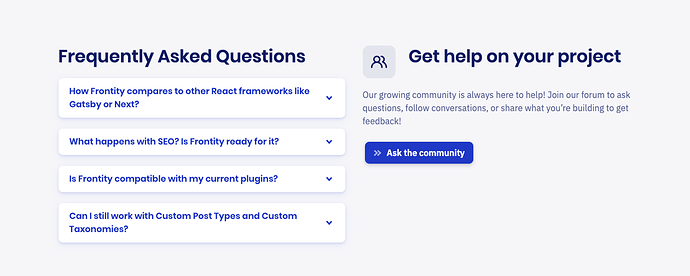Frequently Asked Questions is a good place to provide straight forward answers to common questions about Frontity. Right now we have a FAQ section in the homepage. There was another FAQ section in the docs that was disabled until we clarified the purpose and content of this section
So the questions we have tracked are…
In frontity.org homepage
In frontity.org we have the following ones:
How Frontity compares to other React frameworks like Gatsby or Next?
Firstly, Frontity is 100% focused on WordPress. This means the number of concepts you need to learn are minimal. It doesn’t require complex configuration to get started, and the APIs that developers use to request content are pre-configured for the things that they most frequently need.
Secondly, Frontity is opinionated. It has its own state manager and it uses Emotion for the CSS. Thanks to that developers do not need to learn the complexities of such technologies as Redux. At the same time it powers a very flexible extensibility pattern, more similar to that of WordPress itself, rather than that of other JavaScript frameworks.
Lastly, it’s rendered dynamically, which means that the HTML does not have to be rebuilt each time the content is edited or new content is published. Our preferred approach is Serverless Pre-Rendering, although there are other ways to configure it.
In addition, there’s no need to learn GraphQL or the REST-API. The data is available to you using the state manager.
What happens with SEO? Is Frontity ready for it?
Yes, it is! Frontity does both server-side and client-side rendering. This approach works great with dynamic content and SEO. And if you use a CDN, it is as fast as serving static files. It has all the content in the HTML so Google is happy and, once JavaScript takes control of the page, the experience feels like a native app.
Is Frontity compatible with my current plugins?
Frontity is compatible with all the plugins that are compatible with the REST-API. Many of them just add their output to the content, and that would work by default.
For plugins that are not compatible with the REST-API you have two options. You can adapt the logic in your Frontity project, or you can use PHP to extend the uncooperative plugin either in your WordPress theme’s functions.php file or in a custom plugin.
Can I still work with Custom Post Types and Custom Taxonomies?
Of course! You just have to add a few settings in your Frontity project and it will work. You can check our docs for a more detailed explanation.
old FAQ section
In an old FAQ section in the docs we had the following questions:
What is Frontity?
Frontity is a free and open source framework for creating WordPress themes based on React. In other words, it allows to build a React frontend for a headless WordPress site, which serves its data via the WordPress REST API.
Combining WordPress and React has plenty of advantages, but there are a lot of things that developers need to learn and configure. Unlike other React frameworks that can work with WordPress, Frontity is an opinionated framework 100% focused on this CMS, which makes everything much easier (even for those developers who are less familiar with React) and optimized to be used with WordPress.
How can I get started?
It is really easy to start using Frontity, you just have to make sure you have Node.js installed and follow this quick start guide.
Do I need any specific knowledge or skills to use Frontity?
You need to know how to use WordPress for your content management and some React knowledge for designing your frontend. The rest is already wired up for you: React, webpack, Babel, SSR, Routing, CSS-in-JS, WP REST API, TypeScript, Linting, Testing… This way, you can focus on building your site. 
How can I contribute to the project?
There are many ways to contribute. You don’t need to be a developer to support the project. If you want to help coding, please go to our GitHub repository. To see other ways to get involved, check out this guide.
Can I use Frontity with WordPress.com?
Sure! Our framework has support for both WordPress.com and WordPress.org sites and it has been designed so it can support other sources like the GraphQL API for WordPress in the future. We are discussing this in the community forum. Feel free to join the conversation.
 I would like to gather feedback about this FAQ section:
I would like to gather feedback about this FAQ section:
- Do you think we need to have a FAQ section?
- If so, where do you think these FAQ should be displayed (and answered)? In frontity.org homepage? in a docs section? In both? Somewhere else?
- Which questions do you think should be displayed? How many questions do you think we should display?

